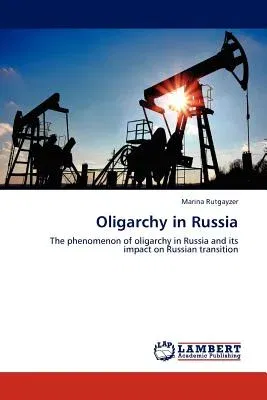Marina Rutgayzer
(Author)Oligarchy in RussiaPaperback, 2 August 2011

Qty
1
Turbo
Ships in 2 - 3 days
In Stock
Free Delivery
Cash on Delivery
15 Days
Free Returns
Secure Checkout
Print Length
76 pages
Language
English
Publisher
LAP Lambert Academic Publishing
Date Published
2 Aug 2011
ISBN-10
3845421363
ISBN-13
9783845421360
Description
Product Details
Author:
Book Format:
Paperback
Country of Origin:
US
Date Published:
2 August 2011
Dimensions:
22.86 x
15.24 x
0.46 cm
ISBN-10:
3845421363
ISBN-13:
9783845421360
Language:
English
Location:
Saarbrucken
Pages:
76
Publisher:
Weight:
122.47 gm

